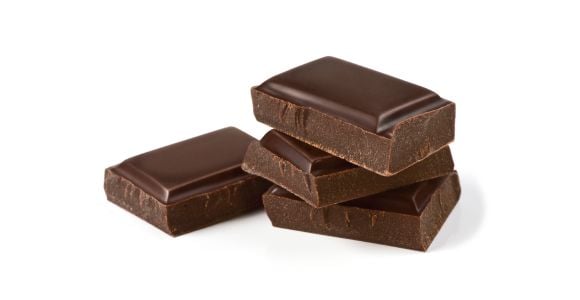Chocolate often gets a bad rap for being a diet disaster. People often associate chocolate with thoughts of indulgence, sin and decadence. However, a growing body of research is finding that chocolate is chock-full of phytochemicals that have been proven to help ward off disease. Chocolate lovers rejoice!
The Health Benefits
Most of the health benefits obtained from chocolate are due to its phytochemicals, which are plant chemicals that bestow health benefits. Phytochemicals, found in a plethora of healthy foods, including fruits, vegetables and other plant-based foods, often act as antioxidants to help fight off free radicals that would otherwise cause damage to our bodies. Chocolate is particularly rich in certain antioxidants called flavanols (the main kind of flavonoids), including catechins, epicatechins and procyanidins. Researchers deem that flavanols up your body's level of nitric oxide, which helps in a host of body processes that reduce your risk for disease.
A large body of research has found that eating chocolate can reduce your risk for heart disease, heart attacks and heart failure. Consuming chocolate is also correlated with a reduced rate of high blood pressure and stroke. Studies have also found that cocoa performs double-duty because it can reduce your bad cholesterol (LDL cholesterol) and increase your good cholesterol (HDL cholesterol) simultaneously. Evidence from several studies also highlights chocolate's ability to significantly lower the risk of diabetes by improving insulin sensitivity. Chocolate has also been shown to reduce damaging inflammation.
Want more reasons to add chocolate to your diet? Other studies have found that chocolate can confer beauty benefits as well. A recent study out of Germany revealed that cocoa helped women's skin appear moister, reduced redness and improved their complexion. Research has also concluded that chocolate can protect your skin from the sun's harmful UV rays.
Other studies have suggested chocolate may help lower stress and anxiety and its damaging effects on your body by decreasing your body's production of stress hormones.
Still not convinced chocolate is healthy? Early evidence has found that chocolate can benefit your brain too. It may bolster your memory, help you pay better attention and feel more alert, and improve other cognitive functioning, such as problem-solving by speeding more blood to your noggin.
One study even discovered that chocolate's theobromine (a phytochemical) content can help suppress coughing. Perhaps cold and flu season calls for a dose of dark chocolate rather than cough drops.
Which Chocolate Is The Healthiest?
Don't go buying all kinds of chocolate candies in bulk just yet. Not all forms of chocolate are created equal--you should know that certain types of chocolate are more beneficial than others. All forms of chocolate originate from cacao (cocoa) beans, which are actually seeds from fruit off a Theobroma cacao tree. The cocoa beans are dried, roasted, fermented or alkalized to reduce its naturally bitter, chalky, unpleasant taste that actually comes from the flavanols that are so good for us. So, as cocoa is processed in order to make it taste so delicious, the bitter-tasting flavanol content is reduced.
Dark chocolate and unprocessed cocoa powders contain many more flavanols than milk chocolate. Unfortunately, the flavanol levels in dark chocolate can vary widely based on how it was processed and the quantity of cocoa solids it has. Manufacturers are trying to strike the right balance between acceptable flavor and beneficial flavanol levels. Because the amount of flavanols in chocolate products doesn't have to be specified on the label, you'll want to purchase dark chocolate with more cocoa solids. Opt for dark chocolate that contains seventy percent cacao (cocoa) or higher.
The Bottom Line
Dark chocolate, without all of the added fat-laden, sugary accompaniments, can be good for you if eaten in appropriate portion sizes (about 7 ounces per week). The research that has unveiled some of chocolate's health benefits has been the result of both short-term studies and the often more-revealing long-term observational research studies, meaning the evidence is very strong. Chocolate sure is chocking up a whole lot of praise from scientists and chocolate-enthusiasts alike.
Kari Hartel, RD, LD is a Registered, Licensed Dietitian and freelance writer based out of St. Louis, MO. Kari is passionate about nutrition education and the prevention of chronic disease through a healthy diet and active lifestyle. Kari holds a Bachelor of Science in Dietetics from Southeast Missouri State University and is committed to helping people lead healthy lives. She completed a yearlong dietetic internship at OSF St. Francis Medical Center in Peoria, IL, where she worked with a multitude of clients and patients with complicated diagnoses. She planned, marketed, and implemented nutrition education programs and cooking demonstrations for the general public as well as for special populations, including patients with cancer, heart disease, diabetes, Alzheimer's disease, obesity, and school-aged children. Contact Kari at [email protected].



